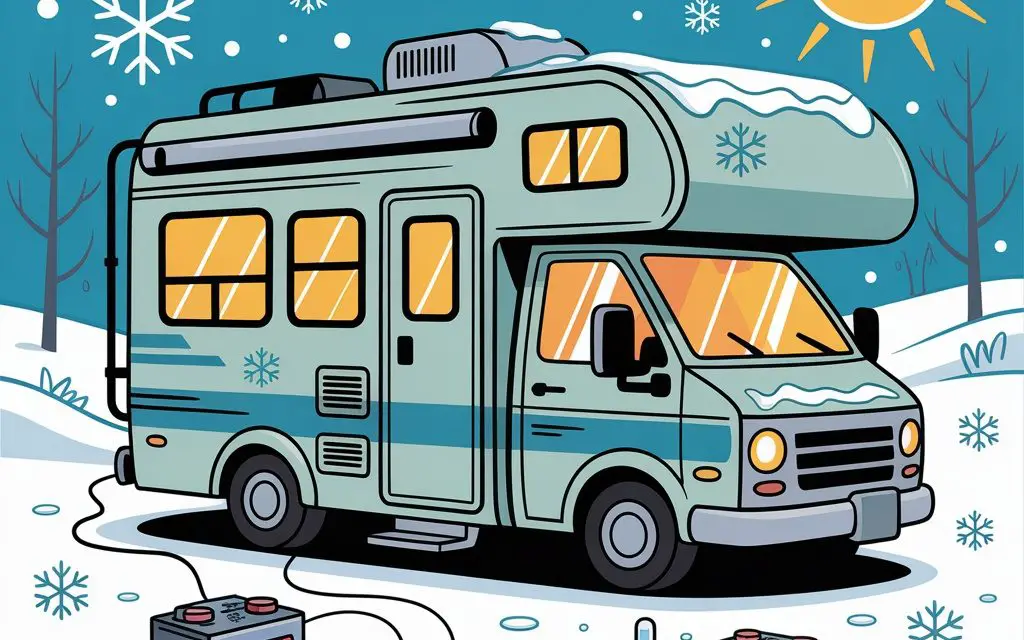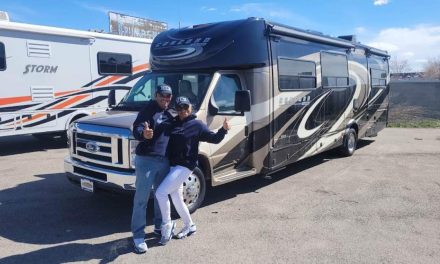Winter camping doesn’t have to mean dead batteries! If you’re planning to take your RV on winter adventures or store it during cold months, you’re probably wondering: can lithium RV batteries freeze?
The good news is that lithium batteries are much better in cold weather than other battery types. But there are still important things you need to know to keep your power running smoothly when temperatures drop.
What Happens to Lithium RV Batteries in Cold Weather?
The Simple Answer: They Don’t Actually “Freeze”
Unlike lead-acid batteries that can freeze solid and even explode, lithium RV batteries don’t freeze in the traditional sense. Here’s why:
- The electrolyte stays constant – it doesn’t get diluted like in lead-acid batteries
- No risk of cracking or exploding from ice formation
- They keep working even in very cold temperatures
But Cold Weather Still Affects Performance
Even though they don’t freeze, cold temperatures do impact how well your lithium batteries work:
What happens when it gets cold:
- Battery capacity drops (you get less power)
- Chemical reactions slow down
- Internal resistance increases
- You’ll need to charge more often
Think of it like your body on a cold morning – everything works, but it takes time to warm up and get going!
How Cold is Too Cold for Lithium RV Batteries?
Safe Operating Temperatures
Most quality lithium RV batteries can handle a wide range of temperatures:
| Function | Temperature Range |
|---|---|
| Discharging (Using Power) | -4°F to 135°F (-20°C to 57°C) |
| Charging | Above 32°F (0°C) ONLY |
| Storage | -15°F to 140°F (-26°C to 60°C) |
Would you like to save this article?
⚠️ Critical Warning: Never Charge Below Freezing!
This is the most important rule: Never charge lithium batteries when they’re below 32°F (0°C).
What happens if you do:
- Permanent damage to the battery
- Reduced lifespan
- Safety hazards
- Voided warranty
Lithium vs. Other Battery Types in Cold Weather
Why Lithium Wins in Winter
Here’s how different battery types handle cold weather:
Lead-Acid Batteries:
- ❌ Electrolyte can freeze and crack the case
- ❌ Performance drops dramatically
- ❌ Can explode if frozen while discharged
- ❌ Heavy and bulky
Lithium RV Batteries:
- ✅ Electrolyte doesn’t freeze
- ✅ Much better performance in cold
- ✅ Lighter weight (half the weight!)
- ✅ Longer lifespan (3,000-5,000 cycles vs. 400)
- ✅ Faster charging
- ✅ Built-in safety features
5 Smart Ways to Protect Your Lithium RV Batteries in Winter
1. Use Heated Lithium Batteries
Best for: RVers who camp in freezing temperatures regularly
Heated lithium batteries have built-in heaters that automatically warm the battery before charging. They’re the easiest solution if you plan to use your RV in winter.
Benefits:
- Automatic temperature control
- No extra equipment needed
- Peace of mind
2. Install External Battery Heaters
Best for: Budget-conscious RVers
You can add heating pads or tank heaters to regular lithium batteries:
- Silicone heating pads – stick directly to battery
- Tank heaters – wrap around battery box
- Heating blankets – cover multiple batteries
Cost: $20-$70 vs. $200+ for heated batteries
3. Insulate Your Battery Compartment
Everyone should do this!
Proper insulation helps maintain stable temperatures:
- Use foam board insulation
- Seal air gaps
- Consider a battery box heater
- Monitor with a thermometer
4. Move Batteries to Heated Storage
Best for: RVers who don’t camp in winter
If you’re not using your RV in cold weather:
- Remove batteries and store indoors
- Keep in garage, basement, or heated shed
- Maintain 32-80°F for best performance
- Check charge monthly
5. Use Smart Charging Systems
Modern charge controllers and inverters often have:
- Temperature sensors that stop charging when too cold
- Remote monitoring to check battery temperature
- Automatic heating control for heated batteries
Winter Storage: How to Store Lithium RV Batteries Properly
If You’re Storing Your RV for Winter
Step 1: Charge to Full
- Charge batteries to 100% (14.4 volts)
- This prevents damage during storage
Step 2: Disconnect Everything
- Remove all power draws
- Parasitic loads will drain batteries
- A dead battery is hard to recover
Step 3: Choose Storage Location
- Indoor storage: Garage, basement (32-80°F is ideal)
- RV storage: Make sure temps stay above -15°F
- Check monthly: Batteries lose 2-3% charge per month
Step 4: Temperature Monitoring
- Use wireless thermometers
- Get alerts if temps drop too low
- Consider moving batteries if needed
Common Winter Battery Problems (And How to Fix Them)
Problem 1: Battery Won’t Charge
Likely cause: Battery is too cold
Solution:
- Warm battery above 32°F first
- Wait 30-60 minutes after bringing inside
- Use external heater if needed
Problem 2: Reduced Runtime
Likely cause: Cold temperatures reducing capacity
Solutions:
- This is normal – capacity returns when warm
- Use battery heaters for consistent performance
- Plan for 20-30% less runtime in extreme cold
Problem 3: Battery Management System (BMS) Shuts Down
Likely cause: Safety protection activated
Solutions:
- Let battery warm up naturally
- Check for error codes
- Contact manufacturer if problems persist
Choosing the Right Lithium RV Battery for Cold Weather
Features to Look For:
Built-in Heating:
- Automatic temperature control
- Low power consumption
- Enable/disable switch
Cold Weather BMS:
- Low-temperature charging protection
- Wide operating temperature range
- Smart temperature monitoring
Quality Construction:
- Rated for RV use
- Good warranty (5+ years)
- Proven cold weather performance
Top Cold Weather Battery Brands:
| Brand | Key Features | Cold Weather Rating |
|---|---|---|
| Battle Born | Heated options, -4°F discharge | Excellent |
| Renogy | Budget-friendly, good BMS | Very Good |
| LiTime | Value pricing, reliable | Good |
| Victron | Premium quality, smart features | Excellent |
Real RV Owner Tips for Winter Battery Success
From Experienced Winter RVers:
“Always warm before charging” – Sarah, full-time RVer “I learned this the hard way. Now I use a small ceramic heater in my battery compartment for 30 minutes before plugging in to charge.”
“Monitor your temperatures” – Mike, weekend warrior “I installed wireless thermometers in my battery box. My phone alerts me if temps drop below 35°F so I can take action.”
“Insulation makes a huge difference” – Linda, snowbird “Adding foam insulation to my battery compartment kept my batteries 10-15 degrees warmer. Simple but effective!”
Frequently Asked Questions
Can I leave my lithium RV batteries in the RV all winter?
Yes, as long as temperatures stay above -15°F and you fully charge them first. Disconnect all loads to prevent drain.
How much capacity do I lose in cold weather?
Expect 10-20% capacity reduction in moderate cold (20-32°F) and up to 30% in extreme cold (below 0°F). Capacity returns when batteries warm up.
Are heated lithium batteries worth the extra cost?
If you camp in freezing temperatures regularly, yes! They eliminate the guesswork and automatically protect your investment.
Can I use a regular battery heater on lithium batteries?
Yes, but use low-wattage heaters (under 50 watts) and monitor temperatures carefully. Overheating can damage lithium batteries too.
What’s the best way to warm up cold batteries?
Bring them to room temperature gradually. Don’t use direct heat sources like heat guns or space heaters directly on the batteries.
Winter RV Battery Maintenance Checklist
Monthly Tasks:
- Check battery charge level
- Monitor storage temperature
- Inspect for any damage
- Clean terminals if accessible
Before Winter Storage:
- Charge to 100%
- Disconnect all loads
- Insulate battery compartment
- Install temperature monitoring
- Record baseline voltage
Before First Spring Use:
- Check charge level
- Inspect for winter damage
- Test all connections
- Verify BMS operation
- Update any firmware
Emergency Winter Battery Solutions
If Your Batteries Are Too Cold to Charge:
Option 1: Patient Warming
- Move to warmer location
- Wait 2-4 hours for gradual warming
- Never rush this process
Option 2: External Heat Source
- Use ceramic space heater nearby (not directly on battery)
- Heating pad on low setting
- Warm blankets around battery box
Option 3: Backup Power
- Small generator for emergency heating
- Portable power station as backup
- 12V heating pads from vehicle
The Bottom Line: Lithium Batteries Are Your Best Winter Choice
Can lithium RV batteries freeze? While they don’t freeze like other batteries, cold weather does affect their performance. But with proper care and the right precautions, lithium batteries are still the best choice for winter RVing.
Key takeaways:
- Never charge below 32°F – this is the golden rule
- They work great in cold – much better than lead-acid
- Simple solutions exist – heating, insulation, and smart storage
- Investment pays off – longer life, better performance, lighter weight
Whether you’re planning winter adventures or just want to protect your investment during storage, following these guidelines will keep your lithium RV batteries running strong for years to come.
Ready to upgrade to lithium? Your winter camping experiences (and your back) will thank you!
Helpful YouTube Videos:
- Cold Weather Lithium Battery Charging | EVERYTHING YOU NEED TO KNOW
- What Happens When Lithium Batteries Are Exposed to Cold Temperatures?
- Do Lithium Batteries Work In Cold Weather? Testing Lithium Vs Lead Acid







